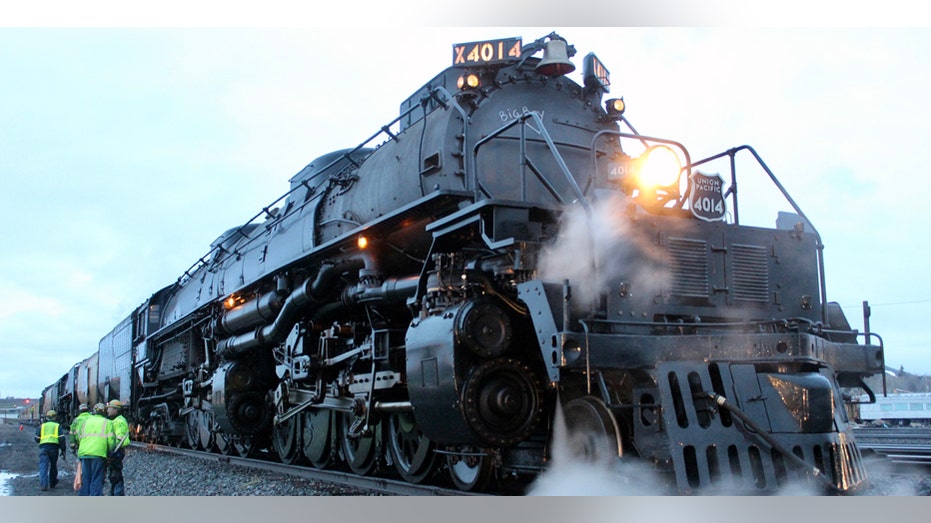When Christmas arrived by rail
America’s railroads delivered at Christmas, bringing glad tidings behind snorting, belching steam locomotives
My grandmother often recalled that her best Christmas present ever arrived by train.
It was December 1944 and my father, barely 19 and her only child, stepped down from a New York Central Railroad coach at Cleveland’s Union Terminal.
He was on leave from the U.S. Army and she breathed a sigh of relief that he was safe. His next stop would be the battlefields of the Southwest Pacific.
Home for the holidays took on special significance in those war years. It was before crowded airports and sluggish interstate highways, long before Skype, FaceTime and Zoom, and certainly long before unmanned drones dropping packages.
CHRISTMAS SHOPPERS PACK STORES AMID CORONAVIRUS AS RESTAURANTS ARE LOCKED DOWN
Back then, Christmas exchanges meant letters carefully written and mailed, a long-planned gift to a loved one, or a surprise visit in person. America’s railroads delivered on all accounts and brought glad tidings behind snorting, belching steam locomotives.
During their heyday in the first half of the 20th century, railroads were the grid of American communication and commerce.

A newly restored Union Pacific Big Boy locomotive returns to the rails after a five-year refurbishment. (Jason Racki/FOX Business)
Americans entrusted letters, payments, parcels and more to this network of coal-fired steeds. There were no Google searches or websites to compare, only the catalogs of Sears and Roebuck and a few other stalwarts.
CHRISTMAS DAY: HERE ARE THE RESTAURANTS, STORES OPEN
One ordered and then waited expectantly until the doorway of a Railway Express baggage car opened – almost magically – to reveal a shiny new bicycle, a special tool, or a new-fangled icebox. It wasn’t next-day delivery, but rail service was incredibly fast for one generation that remembered wagon wheels and another that looked skyward to airplanes.
Passenger trains carried bags of mail almost from their inaugural runs and clerks soon began sorting their contents as trains rushed through the countryside.
GET FOX BUSINESS ON THE GO BY CLICKING HERE
Railway Post Office (RPO) cars housed a maze of canvas bags and wooden slots that literally “pigeonholed” letters by stations along the route. A massive hook adjacent to the car door pivoted outward to snag a canvas pouch of outgoing mail hanging from a trackside pole at small towns. As the train sped on without stopping, a clerk threw an in-bound pouch onto the station platform.
Parcel service was the domain of the Railway Express Agency (REA), created in 1917 after the railroads were nationalized during World War I.
After the war, Railway Express continued to operate the nation’s largest parcel shipping service. Its red-diamond sign with white lettering became a common sight on baggage cars and station platforms, and REA’s forest-green delivery trucks connected the depot to homes and businesses. At its peak during World War II, Railway Express was UPS and FedEx combined.
Christmas rode the rails in other ways, too. On the crack passenger trains that hurtled coast-to-coast, such as the Atchison, Topeka and Santa Fe’s Super Chief or the New York Central’s Twentieth Century Limited, diners and parlor cars were festooned with ample evidence of the season.
On sleepy country railroads, particularly those aging narrow gauge routes, train crews decorated their engines with pine bough garlands and more likely than not gave Santa Claus a ride into town.
CLICK HERE TO READ MORE ON FOX BUSINESS
This past year has brought my grandmother’s 1944 anxiety home to all of us.
Hurricanes battered the South, wildfires enflamed the West, and the COVID crisis has left no corner of America unscathed. Even amid a global pandemic just-in-time delivery remains the expectation of the 21st century, but nothing can equal the nostalgia of a time when all of America relied on the railroads.
As we gather in uncertain times and celebrate in unplanned ways, may we draw encouragement from memories of our nation’s perseverance in prior tough times. Whether loved ones step down from a rail coach or appear digitally on the computer screen, let us all breathe a sigh of relief and move forward together.
Adapted from "Iron Horses: America’s Race to Bring the Railroads West."
Walter R. Borneman is the author, most recently, of "Brothers Down: Pearl Harbor and the Fate of the Many Brothers Aboard the USS Arizona (Little, Brown 2019). He holds both a master's degree in history and a law degree. He lives in Colorado.




















